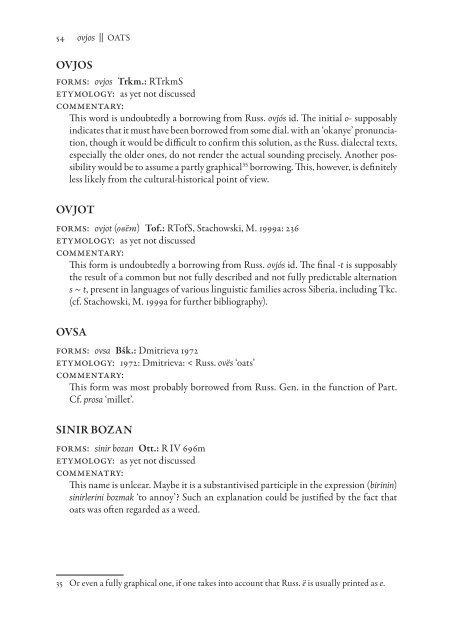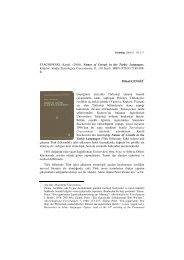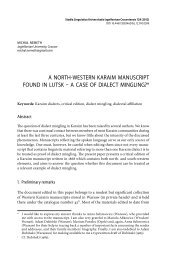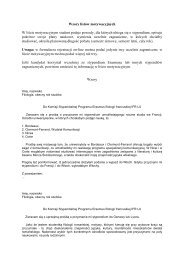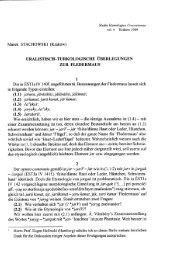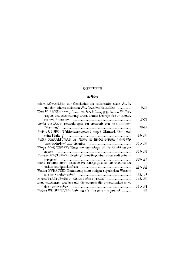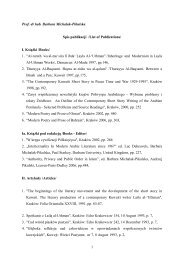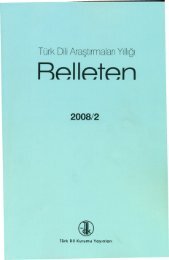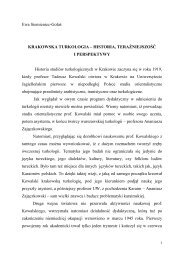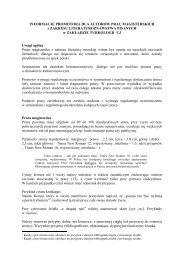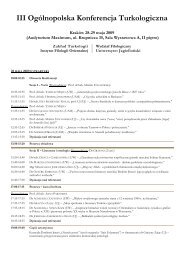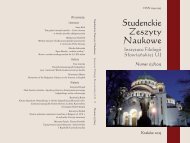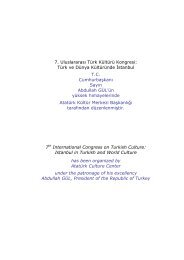Oats || nyxa 53We would like to suggest a slight modification <strong>of</strong> this etymology, and – as no ultimatepro<strong>of</strong> can be presented here – ano<strong>the</strong>r proposition for expla<strong>in</strong><strong>in</strong>g this word.In anlaut, <strong>the</strong> alternation j- ~ ǯ- can be expla<strong>in</strong>ed by a purely Tkc. alternation which,however, has not been studied thoroughly enough to allow for a full verification <strong>of</strong>this assumption. However, what seems to be more problematic is <strong>the</strong> lack <strong>of</strong> -v- and achange from <strong>the</strong> rema<strong>in</strong><strong>in</strong>g -aa-, -aə- &c. <strong>in</strong>to -u-. This is why we believe that <strong>the</strong> firstpart <strong>of</strong> this compound should have ra<strong>the</strong>r been borrowed from a form such as liter.Pers., i.e. ǯou.The second part def<strong>in</strong>itely should have been a word <strong>of</strong> back vocal harmony. Wecould take <strong>in</strong>to consideration such forms as Talyš., Arab. or Pers. (dial., not liter.,with non-palatalised short a’s). Arab. can probably be excluded, as it would requirean assumption, that on <strong>the</strong> dial. Tkc. ground a presumably local borrow<strong>in</strong>g fromdial. Pers. / Talyš was compounded with a borrow<strong>in</strong>g from Arab. which is quiteunlikely. On <strong>the</strong> o<strong>the</strong>r hand, a compound<strong>in</strong>g <strong>of</strong> a form such as <strong>the</strong> liter. Pers. ǯou(which could have appeared <strong>in</strong> dial., too) with a Pers.dial. / Talyš form [alaf], seemsto be quite realistic.There is still at least one more way <strong>of</strong> expla<strong>in</strong><strong>in</strong>g this word. Namely, it could be regardednot as a compound, but as an iotated borrow<strong>in</strong>g form Arab. علف ‘alaf ‘dry grass; hay;fodder’. Iotation is not a common phenomenon, and def<strong>in</strong>itely not a regular one, whichis certa<strong>in</strong>ly a weakness <strong>of</strong> this proposition. Tek<strong>in</strong> 1975: 205 gives only three examples<strong>of</strong> modern ju- deriv<strong>in</strong>g from MTkc. long vowel: *ī-, *ō-, *ȫ-, and all <strong>of</strong> <strong>the</strong>m come fromSarUyg. As far as our knowledge goes, it has not yet been established what <strong>the</strong> conditionsallow<strong>in</strong>g for iotation were <strong>in</strong> dial. Tksh. (Ott.). If <strong>the</strong>y were <strong>the</strong> same, one couldbelieve that ‘a- was rendered as *ȫ- > ju- 34 . In such a case, only <strong>the</strong> Arab. form could betaken <strong>in</strong>to consideration, <strong>the</strong> Pers. ‘- be<strong>in</strong>g noth<strong>in</strong>g but a graphical tradition with noimportance for <strong>the</strong> actual sound<strong>in</strong>g.From <strong>the</strong> semantic po<strong>in</strong>t <strong>of</strong> view, ‘grass; hay; fodder’ > ‘oats’ is at least as probableas ‘barley grass’ or similar > ‘oats’, given that oats are <strong>of</strong>ten used for fodder.None <strong>of</strong> <strong>the</strong> three propositions is completely conv<strong>in</strong>c<strong>in</strong>g. Ultimately, <strong>the</strong> modifiedversion <strong>of</strong> ÈSTJa’s explanation appears to be <strong>the</strong> most realistic.nyxaforms: nyxa Kmk.: RKmkS, Dmitrieva 1972etymology: as yet not discussedcommentary:The sound<strong>in</strong>g <strong>of</strong> <strong>the</strong> word clearly suggests a borrow<strong>in</strong>g, presumably from one <strong>of</strong> <strong>the</strong>Cauc. languages, but we have not managed to establish <strong>the</strong> exact source.34 Although cf. Tksh.dial. alaf, alef ‘fodder for animals; hay’ (Tietze 2000).
54 ovjos || Oatsovjosforms: ovjos Trkm.: RTrkmSetymology: as yet not discussedcommentary:This word is undoubtedly a borrow<strong>in</strong>g from Russ. ovjós id. The <strong>in</strong>itial o- supposably<strong>in</strong>dicates that it must have been borrowed from some dial. with an ‘okanye’ pronunciation,though it would be difficult to confirm this solution, as <strong>the</strong> Russ. dialectal texts,especially <strong>the</strong> older ones, do not render <strong>the</strong> actual sound<strong>in</strong>g precisely. Ano<strong>the</strong>r possibilitywould be to assume a partly graphical 35 borrow<strong>in</strong>g. This, however, is def<strong>in</strong>itelyless likely from <strong>the</strong> cultural-historical po<strong>in</strong>t <strong>of</strong> view.ovjotforms: ovjot (овëт) T<strong>of</strong>.: RT<strong>of</strong>S, Stachowski, M. 1999a: 236etymology: as yet not discussedcommentary:This form is undoubtedly a borrow<strong>in</strong>g from Russ. ovjós id. The f<strong>in</strong>al -t is supposably<strong>the</strong> result <strong>of</strong> a common but not fully described and not fully predictable alternations ~ t, present <strong>in</strong> languages <strong>of</strong> various l<strong>in</strong>guistic families across Siberia, <strong>in</strong>clud<strong>in</strong>g Tkc.(cf. Stachowski, M. 1999a for fur<strong>the</strong>r bibliography).ovsaforms: ovsa Bšk.: Dmitrieva 1972etymology: 1972: Dmitrieva: < Russ. ovës ‘oats’commentary:This form was most probably borrowed from Russ. Gen. <strong>in</strong> <strong>the</strong> function <strong>of</strong> Part.Cf. prosa ‘millet’.s<strong>in</strong>ir bozanforms: s<strong>in</strong>ir bozan Ott.: R IV 696metymology: as yet not discussedcommenatry:This name is unlcear. Maybe it is a substantivised participle <strong>in</strong> <strong>the</strong> expression (bir<strong>in</strong><strong>in</strong>)s<strong>in</strong>irler<strong>in</strong>i bozmak ‘to annoy’? Such an explanation could be justified by <strong>the</strong> fact thatoats was <strong>of</strong>ten regarded as a weed.35 Or even a fully graphical one, if one takes <strong>in</strong>to account that Russ. ë is usually pr<strong>in</strong>ted as e.


